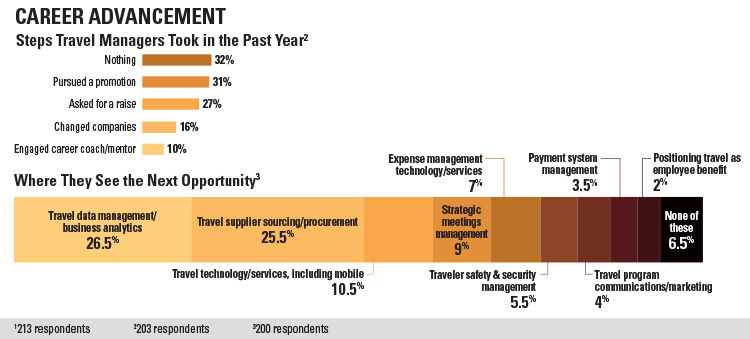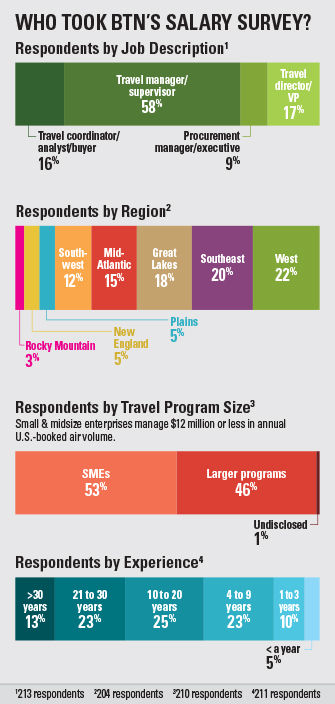
The average travel manager's total 2019 compensation as recorded in BTN's Annual Salary Survey dipped just a bit from the 2018 edition, a finding that industry veterans and neophytes alike could find discouraging. After all, the overall U.S. unemployment rate remains low, the economy appears solid and many organizations of all sizes appear financially stable—all factors that should give travel managers a sturdy foundation to negotiate salary.
But a deeper look at the responses to the survey—BTN's 36th annual effort to document the compensation of business travel managers, whatever their seniority and wherever they work—might offer some optimism. Among all respondents who provided their compensation as of both Jan. 1, 2018, and Jan. 1, 2019, the average increased nearly 6 percent. And the share of respondents who identified as travel directors or VPs is lower than in prior editions. For example, 17 percent of this year's respondents defined themselves as such, versus 22 percent in 2018, a fact that by itself could limit the average salary compared with last year's.
RELATED: BTN's 2010 through 2018 Salary Surveys
The 213 respondents who responded to BTN's survey this year reported an average annual compensation—including salary, bonuses and incentives—of $114,563, a little more than half a percentage point lower than those who responded last year. Those respondents, overwhelmingly female, generally are optimistic that their salaries will at least hold steady in the next few years but aren't certain they're paid enough today. They see themselves staying with their present organizations for the next few years but are eyeing travel data management/business analytics and supplier sourcing/procurement as opportunities for advancement. They generally feel their efforts are reasonably well recognized by their employers and are quite aware that New Distribution Capability could bring big changes to their jobs.
Salary Trends
Macroeconomic factors support a healthy market for employees, and survey respondents offered positive reports of their own 2019 compensation hikes. But there's another factor to consider when assessing this report. About 5 percent of the respondents reported less than a year of travel management experience, and their average compensation is $75,300. By contrast, such rookies made up only 1 percent of the 2018 survey.
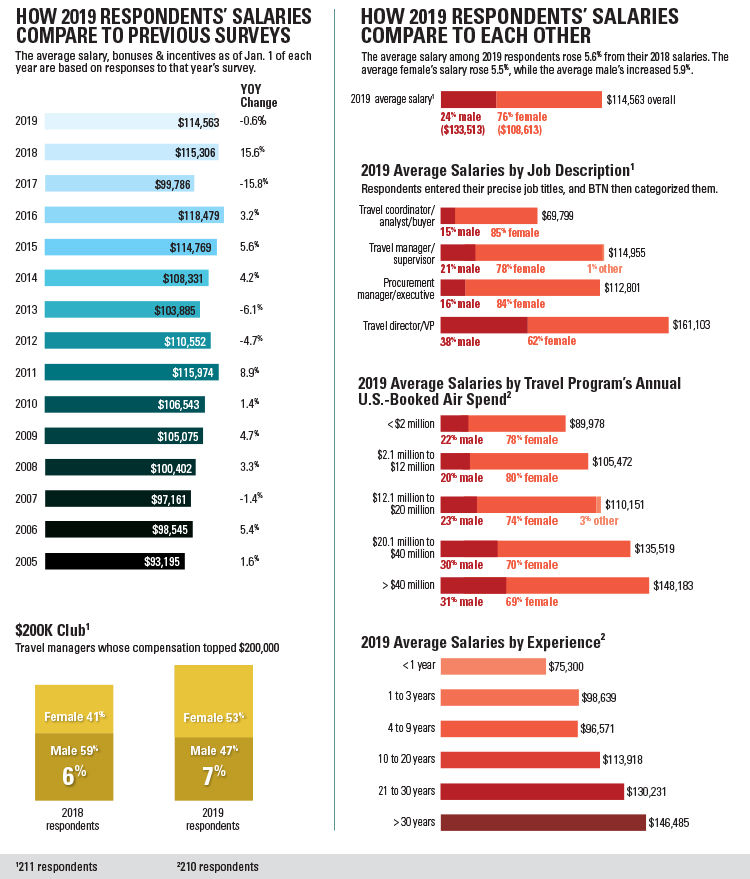
On the other hand, the 2019 survey has a notably higher share of travel programs that spend at least $12.1 million in annual U.S.-booked air volume—46 percent of this year's respondents work for those organizations, while only 37 percent of last year's base did. The average 2019 compensation at small and midsize enterprises is $100,496, while that of larger companies is $131,302.
Which brings us to the relative paucity of travel directors, VPs and even higher-level respondents in this year's survey. BTN does not weigh its respondent sample to reflect real-world demographics. Is the lower number of high-level execs simply chance, or are those survey recipients less likely to respond if they don't feel they have good financial news to share? We can't know. But don't overlook the possibility that the lower response rate could signal some softness in top-tier compensation.
A Geographic Breakdown
New York City may be the financial capital of the world, but travel managers who want to make the big money might consider fleeing the Big Apple for … Philadelphia. Or Atlanta. Or Dallas. Or any other major city included in this survey. Respondents from each other city in the survey earned more on average in 2019 than did their compatriots in New York. Counterintuitive, yes, and sample sizes here can get pretty small, but the fact remains that the $106,000 reported by New York respondents trailed every other major U.S. metropolitan area.
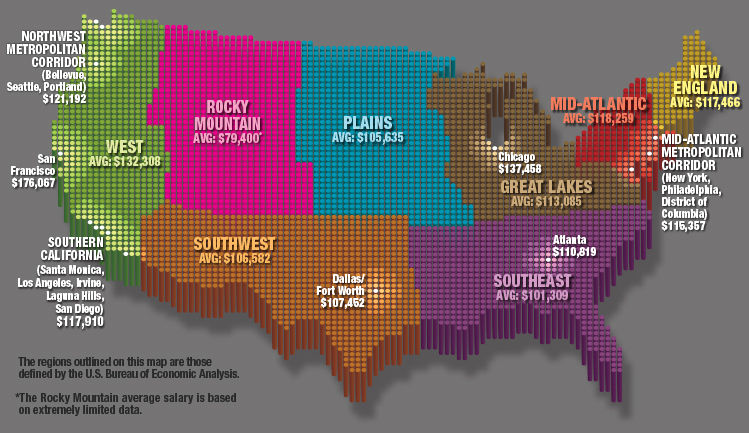
Travel managers' most lucrative home? San Francisco, where respondents in 2019 earned, on average, more than $176,000, a figure boosted up by a disproportionate number of director and VP respondents. Still, the local tech boom and IPO surge has sent prices in San Francisco soaring, and travel managers' salaries seem to be keeping up.
More broadly, respondent compensation in the West was higher than any other U.S. region, followed by the Mid-Atlantic states, New England and the Great Lakes states. Salaries were slightly higher in the Southwest than in the Plains, and the Southeast sat ahead of the Rocky Mountain states.
Feeling underpaid knows no borders, and the way respondents felt about their compensation was relatively consistent across regions. However, respondents from Atlanta, Chicago, Dallas, Los Angeles, New York and San Francisco were far more likely to feel well-recognized for their professional efforts, at 40 percent, than their comrades elsewhere, at 25 percent. Conversely, only 17 percent of these city dwellers considered their efforts inadequately recognized, versus 28 percent elsewhere.
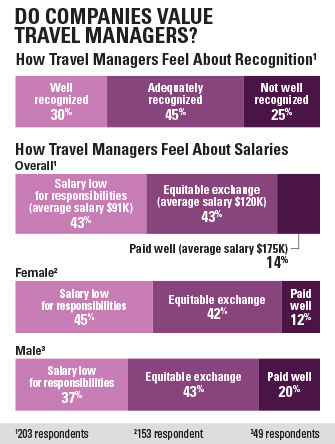
Mind the (Gender) Gap
Women reported an average compensation of $108,613, compared with $133,513 reported by men. As such, women earned 81 cents for every dollar their male counterparts made, up a bit from the 78 cents represented last year and historically in line with this survey's gender gap.
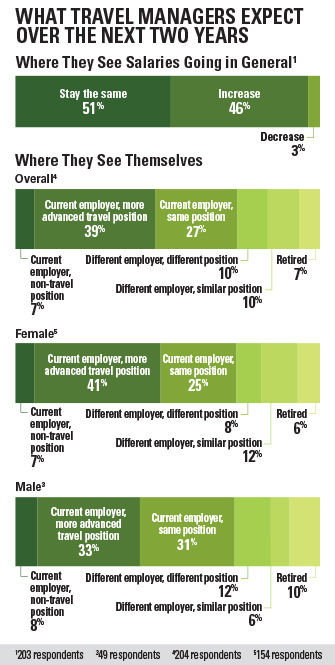
A key factor in the disparity between men's and women's compensation in this survey traditionally has been the disproportionate number of men filling senior roles and making top salaries. This year, women make up 62 percent of the travel director/VP respondents, but they also make up a whopping 76 percent of the overall respondent base. Women also make up 85 percent of the travel coordinators, analysts, buyers and associated titles, which comprise the lowest-salaried tier. Additionally, 82 percent of the respondents with less than one year of industry experience are women.
Cashing Out, Cashing In
About 43 percent of respondents consider their salary low for their responsibilities, a touch higher than the 41 percent who felt that way in 2018. Forty-five percent of women are likely to consider themselves underpaid, compared with 37 percent of men.
Another 43 percent consider their compensation to be fair in the context of their responsibilities, and that's consistent among men and women. The remaining 14 percent of respondents, who have an average 2019 salary of $175,000, consider themselves well-paid.
Most travel managers are taking the initiative to advance their careers and increase their salaries, including 27 percent who directly asked for a raise in the past year. (No word on whether those requests were successful.) About 31 percent pursued a promotion, while 16 percent changed employers and about one in 10 engaged a career coach or mentor.
Taking on additional responsibilities and marketing one's successes are other approaches to gaining higher compensation. Sonepar USA T&E administrator Tricia Mauldin, based in Orlando, has worked to broaden her travel footprint at the midmarket business-to-business electrical distributor. Hired to roll out expense management and corporate payment platforms, she suggested she administer the company's online booking tool, as well. And she now does so.
Sonepar has grown quickly in recent years through several acquisitions, and while the parent company has not pushed for a unified travel program, Mauldin via an internal Yammer account has persuaded other units to use negotiated agreements to save them money. Spotlighting the hard-dollar value of travel management is an approach she hopes pays off for her, too. "I do get an annual raise, but I would think [it's] below what a recognized travel manager would be getting," she said, noting the company is "so far out of the travel industry, they didn't understand what a travel department could do for the company and they also don't know what it pays."
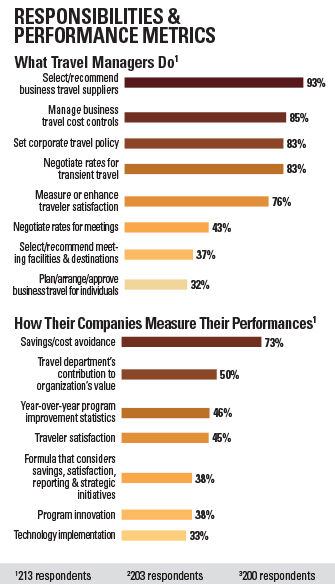
You Better Recognize
About 30 percent of respondents, at an average salary of $134,045, consider their efforts well-recognized by their employers, up from 24 percent last year's survey. Another 45 percent, whose salaries average $111,791, consider themselves adequately recognized. The remaining 25 percent, with an average $100,870 salary, consider their efforts not well-recognized.
Recognition, of course, is in the eye of the beholder. For some, it can be folded and put in a wallet, while others are motivated in other ways. Jennifer Brown, corporate travel and meetings manager for Plano, Texas-based Pharmaceutical Strategies Group, once was a Las Vegas hotel assistant general manager. She was lured to the midmarket consultancy with the opportunity to build a travel program. "They literally let me design their entire program, from start to finish," Brown said. "I'm the one doing everything from picking our TMC and our vendors. I'm their trusted adviser on all things travel."
The recognition Brown has received from the company has helped maintain her job satisfaction. "Obviously, we're all motivated by a paycheck," Brown said, citing bonuses, an internal award and recognition at company meetings as other forms of motivation. "But it's truly the appreciation I get. I have amazing owners, VPs and senior directors, and they are all so appreciative of everything I do, which is motivating to keep doing better each time we have an event or roll out a new trusted hotel partner. It's a two-way street."
What Happened & What's Next
Asked to detail the biggest changes in their jobs in the past 12 months, several travel managers noted organizational changes. "More responsibility since another department merged with us," wrote one, while others noted, "Increased responsibility and visibility when I started reporting directly to chief procurement officer," and, "New leadership is focused on cutting costs. This is a culture shock."
Others said the biggest job change related to travel management itself—from technology implementation to selecting a new travel management company to further globalizing the travel program. "Transforming the current program to conform with our new people-first culture," noted one.
For Mattie Yallaly, corporate T&E manager for St. Louis-based midmarket IT and management consultancy Perficient, the most notable change has been the intrusion of accounting practices into the travel management role. "From conversations I have with travel managers here in St. Louis and [other] meetings, this morphing of accounting into this position is becoming more and prevalent, and I am not an accountant at all," said Yallaly, who serves as a board member for her local Global Business Travel Association chapter. "I can budget just fine, but all these little numbers and little boxes drive me crazy after a while." She's looking to procurement and other travel management roles as a next career step.
Projecting the biggest industry change that will affect their jobs in the coming year, 22 percent volunteered that NDC would be that change agent. Several others cited technology, be it artificial intelligence, disruptors, mobile apps or data privacy laws.
